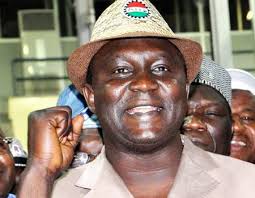Negotiations by the Tripartite Committee on a new National Minimum Wage have run into a stalemate, following the federal government’s stance that it cannot afford more than N25,000 per month.
But Organised Labour and Organised Private Sector, OPS, have agreed on a N30,000 minimum wage per month.
This is even as Ayuba Wabba, President of Nigeria Labour Congress, NLC, told newsmen in Abuja yesterday that the Tripartite Committee has completed its assignment for onward submission to President Muhammadu Buhari.
When the tripartite committee resumed sitting last Thursday, the Federal Government shocked other social partners with its presentation of N21,700.
Recall that it was the federal government’s failure to present its figure at previous meetings and subsequent adjournment without a resumption date that a nationwide industrial action by organized Labour was staged between September 27 and 28, before it was suspended on Sunday, September 30.
The suspension was sequel to government’s reconvening of the committee for Thursday October 4 and Friday October 5, respectively.
However, disappointed with the federal government’s figure and sensing unwillingness on the part of government to increase the wages of workers in the midst of crushing economic hardship, Organised Labour and OPS reached an accord, with OPS upping its earlier figure of N25, 000 to N40, 000.
It will be recalled that OPS had in the beginning of negotiations, made presentation of about N42, 000, after sampling the opinion of members and their ability to pay, before the figure wass further brought down to N25, 000.
This new N40,000 position by OPS was said to have infuriated the Minister of Labour and Employment, Senator Chris Ngige, who it was gathered, insisted that the both the federal and state governments would not be able to pay.
According to sources, after too negotiations and debates, Organised Labour and OPS came down to N30,000, while the Labour and Employment Minister was quoted to have said that the governors would not be able to pay above N25, 000.
The source said: ”He has forgotten that a less buoyant Edo State had been paying N25,000 minimum wage for almost three years now.
”Of course, this was rejected by other social partners as being grossly inadequate, considering the prevailing economic reality in the country.
”This led to a stalemate which made the Minister to adjourn the meeting once again without giving a new date for the committee to reconvene. It is expected that the committee should reconvene before Friday in interest of industrial peace.
”However, whether government agrees or not, this is a tripartite committee comprising government, labour and private sector employers. The good thing is two legs to the tripod are on the same page.
”In fact, some of us believe the work of the committee has been completed and we are likely to submit our report any moment from now. For your information, organized labour will be having a joint briefing on Tuesday at about 4 pm to give details of our negations to our members.”
Meanwhile, President of Nigeria Labour Congress, NLC, Ayuba Wabba, has said the Tripartite Committee on Minimum Wage has completed its assignment for onward submission of its report to President Muhammadu Buhari.
Speaking after the NLC picketed two private firms in Abuja, Wabba said the committee used two-days to reconvene and deliberate on a new minimum wage figure that was acceptable to all employers of labour in the country.
“I want to assure workers that all had been concluded and will be passed for signing within the week.
”I also want to appreciate Organised Private Sector, Manufacturers Association of Nigeria and Nigeria Employers Consultative Association, NECA, for their resolve to pay the new minimum wage when it is signed into law.”
The NLC president, however, refused to disclose the figure arrived at by the Tripartite Committee on the new National Minimum Wage.
Wabba said the Presidency would make it public after deliberation by the National Economic Council.
Recall that the federal government, under Shehu Shagari’s administration introduced a minimum wage of N125 per month in 1981; in 1989, General Ibrahim Babangida’s government increased it to N250.
Similarly, the General Abdusalami Abubakar’s administration increased the minimum wage to N3,000 in 1999, while ex-President Olusegun Obasanjo’s government raised to N5,500 for states and N7,500 for federal workers and those of oil producing states in 2000.
In a similar vein, the government of ex-President Goodluck Jonathan increased the minimum wage to N18,000 in 2010/2011.

